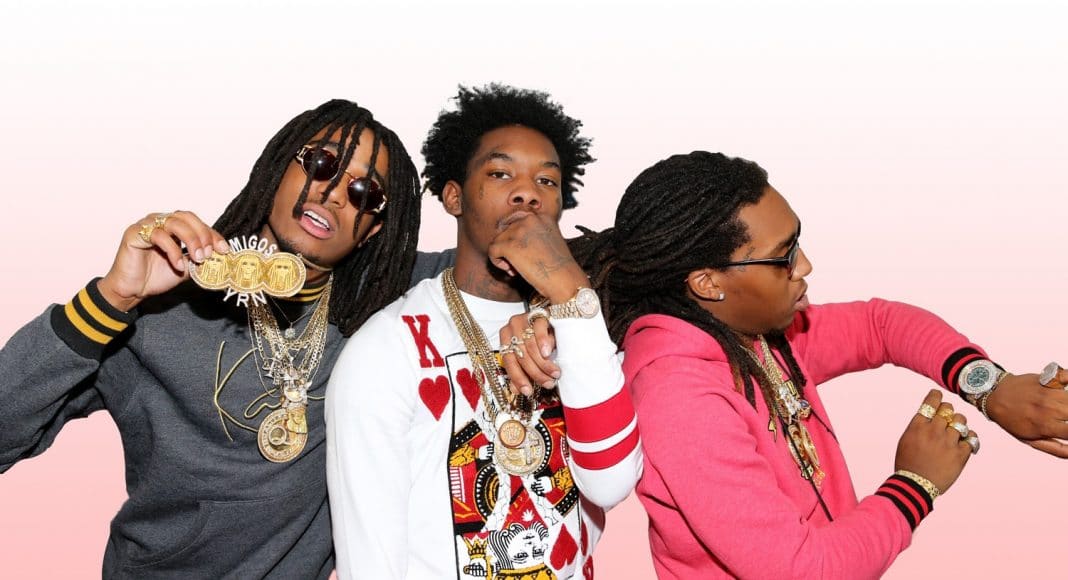Have you ever memed before? Have you ever been memed? It’s a weird feeling, those big, blocky white letters covering your face or directed your way. Perhaps someone placed the Crying Jordan meme atop a loved one’s visage; maybe that “someone” was you, meme-ing an uncle after your younger generation squad finally won in the holiday football game.
Whatever your stance, memes are an reality-blurring undeniable aspect of culture, a specific brand of culture. Hold that thought.
Donald Glover won two Golden Globes Sunday night. As creator/director/writer/actor in FX’s reality-blurring Atlanta, Glover was on stage to receive awards for Best Television Series—Comedy or Musical and Best Television Actor—Comedy or Musical. During his show’s acceptance speech for the former, Glover took time to thank Migos, who appear in an episode. But that’s not why Glover was shouting them out. He was just appreciative they made “Bad and Boujee.”
“Like that’s the best song ever,” he said.
https://twitter.com/ComplexPop/status/818270915490435074
Reporters asked Glover to clarify his comments later backstage. Some had never heard of these Migos or their record “Bad and Boujee.” Why shout them out?
“I think they’re the Beatles of this generation and they don’t get a lot of respect,” he said, hinting at a long-gestating internet argument/troll. “Sort of like the YouTube generation I kind of came up with, there’s a generation of kids that are growing up on something that’s completely separate from a whole group of people—and honestly, that song’s just fly. There’s no better song to have sex to.”
Since Glover’s shoutout, “Bad and Boujee” has seen a 234% increase on Spotify streaming. It’s now the No. 1 song on the Billboard Hot 100.
That “Bad and Boujee” would end here wasn’t a foregone conclusion, but it isn’t all that surprising. The track is a firestorm of catchiness and catch phrases, attributes of any great Migos song. From its first moody guitar strum, it throws you into a tidal wave of hype that only swells throughout the record. It signals youthful anarchy through cooled condescension: My life’s better than yours, I can afford whatever I want, but I still eat Cup of Noodles. Who cares if you care?
It’s the Kardashian-Jenners eating Popeye’s in their PJs but, you know, genuine and fresh.
https://www.instagram.com/p/2rnaVrnGk2/
Not only do you love the song, you love to love this song. It excites you and everyone around you instantaneously. A drug in audio form. Just watch this crowd in Nigeria lose their mind and spirits when Migos performs “Bad and Boujee.”
https://twitter.com/JohnTheDapperDJ/status/811391432007237632
Part of the success and bigness of that record—its own merit well-established—must be attributed to memes. Nothing spreads faster and transforms the meaning of art like memes. They create this sense of instant memories, imbuing well-worn nostalgia into songs and moments not even weeks old. But within an always-accelerating culture, days are months and weeks are years. So when a meme-generating track like “Bad and Boujee” plays, you’re not only celebrating the song, you’re reveling in reliving these mini digital moments you previously experienced, too.
https://twitter.com/zackfox/status/806697582927970305
https://twitter.com/waanwaan_/status/812726341523095553
This type of joy can compound infinitely. Such was evidenced by Rae Sremmurd’s “Black Beatles,” the unofficial anthem of last year’s Mannequin Challenge. Before its attachment to the challenge, it was just an underground hit. Then it blew up. What’s perhaps surprising to learn is that pairing “Black Beatles” to the Mannequin was such a concerted effort behind the scenes by Interscope, Rae Sremmurd’s label, and Pizzaslime, a music blog/branding power.
“[It] was really just a vessel for people to hear the music for the first time,” Interscope’s Gunner Safron said. “I think a lot of our technique is really just trying to find content and build content around the music that’s shareable, which then gives people a chance to discover on their own.”
A significant part of music culture now is the ability to participate with your favorite artist as they release projects. It’s remix culture on steroids. Think of how Kanye’s Life of Pablo album cover became a meme, fans writing their own all-caps versions, usually instructing Ye to release the album. It solidified as meme thanks in part to Kanye joining, playfully blaming Chance for Life of Pablo’s delay. Kanye memed himself. (Whenever someone claims Kanye needs to be “more humble,” remember he’s one of our most self-deprecating artists.)
https://twitter.com/kanyewest/status/698536480550084614?lang=en
No one actively feeds meme culture like Drake. His “Hotline Bling” music video capitalized on the power of internet parody artists long before others understood their voracious hunger. His “Hotline Bling” music video, especially in retrospect, seems specifically crafted to pull GIFs, meme, screenshot, and share in various ways. Drake either realized, or stumbled into the idea, that these people weren’t discrediting or truly making fun of him. (Okay maybe a bit.) But what really happens is everyone feels part of the moment, something they can reference and remember forever.
Drake always on beat https://t.co/ayehsCl1QP
— 💫 (@sammytellem) October 20, 2015
@Drake Tennis Champ 🎾 #HotlineBling https://t.co/4lKUaLSMtc
— caleb natale (@caleb_natale) October 21, 2015
As Safron said, it’s a “vessel.” None of this would matter if the art itself couldn’t withstand the scrutiny. Artists and labels will chase creating those moments for fans, if they haven’t already. This will become the new marketing—people becoming commercials for content without ever realizing it. Though that’s a cynical thought, we do, after all, live in an era where people call themselves brands instead of human beings.


